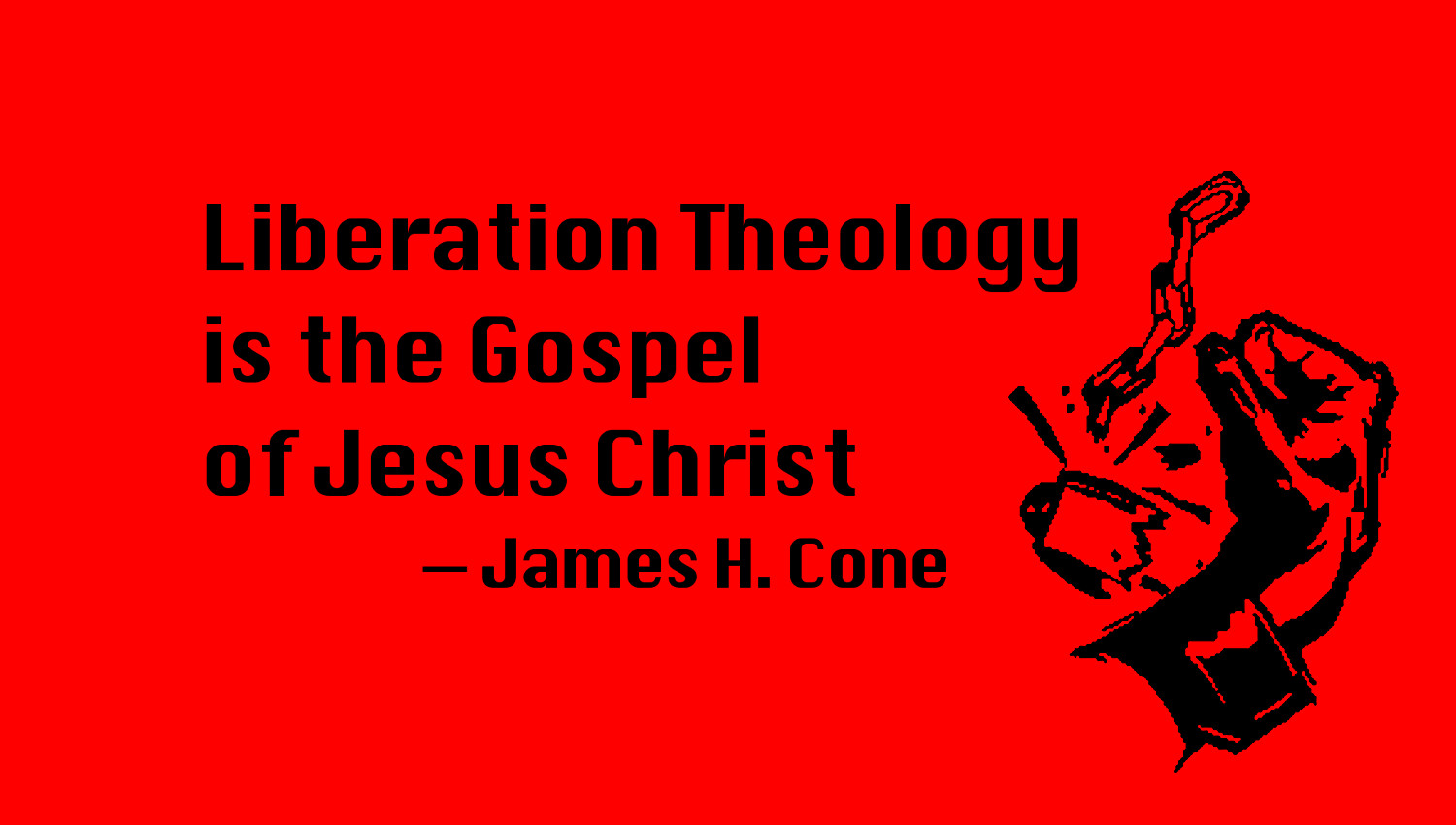 James H. Cone defines the Gospel of Jesus Christ in terms of liberation theology. According to Cone, the Gospel is not an abstract idea or spiritual truth that applies to all people indiscriminately—both victims and victimizers alike—because God specifically sides with the oppressed, and the Gospel is the liberation of all oppressed people from oppressive forces. The Gospel is not an abstract of idea of liberation either, but refers specifically to people who are actively being oppressed now, and it means the victory of the victims over their victimizers.
James H. Cone defines the Gospel of Jesus Christ in terms of liberation theology. According to Cone, the Gospel is not an abstract idea or spiritual truth that applies to all people indiscriminately—both victims and victimizers alike—because God specifically sides with the oppressed, and the Gospel is the liberation of all oppressed people from oppressive forces. The Gospel is not an abstract of idea of liberation either, but refers specifically to people who are actively being oppressed now, and it means the victory of the victims over their victimizers.
Cone says that Liberation Theology runs throughout the Bible from the Old Testament and the New, especially in the examples of Israel being delivered from slavery and was the mission of Jesus who said "The Spirit of the Lord is upon me, because he has anointed me to preach good news to the poor. He has sent me to proclaim release to the captives and recovering of sight to the blind, to set at liberty those who are oppressed, to proclaim the acceptable year of the Lord" (Luke 4:18-19).
In this post, I've assembled quotations from James H. Cone's A Black Theology of Liberation that are helpful understand why Cone says that Liberation Theology is the Gospel of Jesus Christ. I realize some of these statements may be alarming to some people, but I believe James H. Cone was right, and he proclaims a message that needs to be heard, especially due to recent events in America today.
Quotations
James H. Cone on The Gospel of Jesus Christ defined as Liberation Theology:
Christian theology is a theology of liberation. It is a rational study of the being of God in the world in light of the existential situation of an oppressed community, relating the forces of liberation to the essence of the gospel, which is Jesus Christ. This means that its sole reason for existence is to put into ordered speech the meaning of God's activity in the world, so that the community of the oppressed will recognize that its inner thrust for liberation is not only consistent with the gospel but is the gospel of Jesus Christ. There can be no Christian theology that is not identified unreservedly with those who are humiliated and abused. In fact, theology ceases to be a theology of the gospel when it fails to arise out of the community of the oppressed. For it is impossible to speak of the God of Israelite history, who is the God revealed in Jesus Christ, without recognizing that God is the God of and for those who labor and are over laden. [2]
James H. Cone on why God is one-sided and why being nonpartisan in revolutionary situations is a theology of the Antichrist:
Firstly, in a revolutionary situation there can never be nonpartisan theology. Theology is always identified with a particular community. It is either identified with those who inflict oppression or with those who are its victims. A theology of the latter is authentic Christian theology, and a theology of the former is a theology of the Antichrist. Insofar as black theology is a theology arising from an identification with the oppressed black community and seeks to interpret the gospel of Jesus Christ in the light of the liberation of that community, it is Christian theology. American white theology is a theology of the Antichrist insofar as it arises from an identification with the white community, thereby placing God's approval on white oppression of black existence. [3]
James H. Cone on the Biblical basis for defining the Gospel as liberation theology:
In the New Testament, the theme of liberation is reaffirmed by Jesus himself. The conflict with Satan and the powers of this world, the condemnation of the rich, the insistence that the kingdom of God is for the poor, and the locating of his ministry among the poor--these and other features of the career of Jesus show that his work was directed to the oppressed for the purpose of their liberation. To suggest that he was speaking of a "spiritual" liberation fails to take seriously Jesus' thoroughly Hebrew view of human nature. Entering into the kingdom of God means that Jesus himself becomes the ultimate loyalty of humanity, for he is the kingdom. This view of existence in the world has far reaching implications for economic, political, and social institutions. They can no longer have ultimate claim on human life; human beings are liberated and thus free to rebel against all powers that threaten human life. That is what Jesus had in mind when he said:
The Spirit of the Lord is upon me, because he has anointed me to preach good news to the poor. He has sent me to proclaim release to the captives and recovering of sight to the blind, to set at liberty those who are oppressed, to proclaim the acceptable year of the Lord (Luke 4:18-19). [4]
James H. Cone on why God is never color-blind:
Secondly, in a racist society, God is never color-blind. To say God is color-blind is analogous to saying that God is blind to justice and injustice, to right and wrong, to good and evil. Certainly this is not the picture of God revealed in the Old and New Testaments. Yahweh takes sides. On the one hand, Yahweh sides with Israel against the Canaanites in the occupancy of Palestine. On the other hand, Yahweh sides with the poor within the community of Israel against the rich and other political oppressors. The God of the biblical tradition is not uninvolved or neutral regarding human affairs; God is decidedly involved. God is active in human history, taking sides with the oppressed of the land. [5]
James H. Cone on why Liberation Theology is for all oppressed, not only blacks:
Therefore to speak of black theology is to speak with the Tillichian understanding of symbol in mind. The focus on blackness does not mean that only blacks suffer as victims in a racist society, but that blackness is an ontological symbol and a visible reality which best describes what oppression means in America. The extermination of Amerindians, the persecution of Jews, the oppression of Mexican-Americans, and every other conceivable inhumanity done in the name of God and country--these brutalities can be analyzed in terms of the white American inability to recognize humanity in persons of color. [6]
James H. Cone explains his dependence upon Karl Barth:
The fourth and last weakness that I wish to comment on was my inordinate methodological dependence upon the neo-orthodox theology of Karl Barth. Many of my critics (black and white) have emphasized this point. It is a legitimate criticism, and I can offer no explanation except that to say that neo-orthodoxy was to me what liberal theology was to Martin Luther King, Jr.--the only theological system with which I was intellectually comfortable and which seemed compatible with the centrality of Jesus Christ in the black church community. I knew then as I know now that neo-orthodoxy was inadequate for my purposes, and that most American theologians who claimed that theological identity would vehemently reject my use of Karl Barth to interpret black theology. However, I did not have the time to develop a completely new perspective in doing theology. I had to use what I regarded as the best of my graduate education. [7]
Conclusion
The above quotations represent only a sample of James H. Cone's theology of liberation, and I highly recommend reading all of his books. Cone's writings are particularly challenging to white readers, but I believe he writes a message that is necessary, especially in America today.
James H. Cone was a professor at Union Theological Seminary, and is well known for his contributions to black theology, and I've been particularly helped by his books, A Black Theology of Liberation, The Cross and the Lynching Tree, and Risks of Faith: The Emergence of a Black Theology of Liberation, 1968-1998.
Sources:
- https://twitter.com/jonathandirk/status/543881443228004352
- James H. Cone, A Black Theology of Liberation, Orbis Press, Maryknoll NY: 2007. 1.
- Ibid. 6.
- Ibid. 2-3
- Ibid. 6.
- Ibid. 8.
- Ibid. xvii.
- Header Image background: By Mqduck at English Wikipedia - Transferred from en.wikipedia to Commons by Liftarn using CommonsHelper., Public Domain, Link




August 17th, 2017 - 18:07
From what I read here, James Cone redefines traditional Liberation theology. I like Cones version.
October 11th, 2017 - 14:18
I like your site and I can follow your reasoning on many topics, but James Cone and most “Liberation Theology” is basically just Marxism masquerading as Christian Theology.
March 22nd, 2018 - 08:30
From each according to their abilities, to each according to their needs?
That was the point of Acts with people selling personal property and giving the proceeds to the elders.
No one is free unless all are free and the existence of oppressed also hurts the oppressor. Liberation lifts all people.
August 2nd, 2019 - 16:28
6 Children, obey your parents in the Lord, for this is right. 2 “Honor your father and mother”—which is the first commandment with a promise— 3 “so that it may go well with you and that you may enjoy long life on the earth.”[a]
4 Fathers,[b] do not exasperate your children; instead, bring them up in the training and instruction of the Lord.
5 Slaves, obey your earthly masters with respect and fear, and with sincerity of heart, just as you would obey Christ. 6 Obey them not only to win their favor when their eye is on you, but as slaves of Christ, doing the will of God from your heart. 7 Serve wholeheartedly, as if you were serving the Lord, not people, 8 because you know that the Lord will reward each one for whatever good they do, whether they are slave or free.
9 And masters, treat your slaves in the same way. Do not threaten them, since you know that he who is both their Master and yours is in heaven, and there is no favoritism with him. Yea this is The Word of God….doesn’t sound like The Gospel and Mr. Cones’s theology is the same
June 7th, 2024 - 22:00
James H. Cone is a towering systematic theologian period. (Rest In Power)